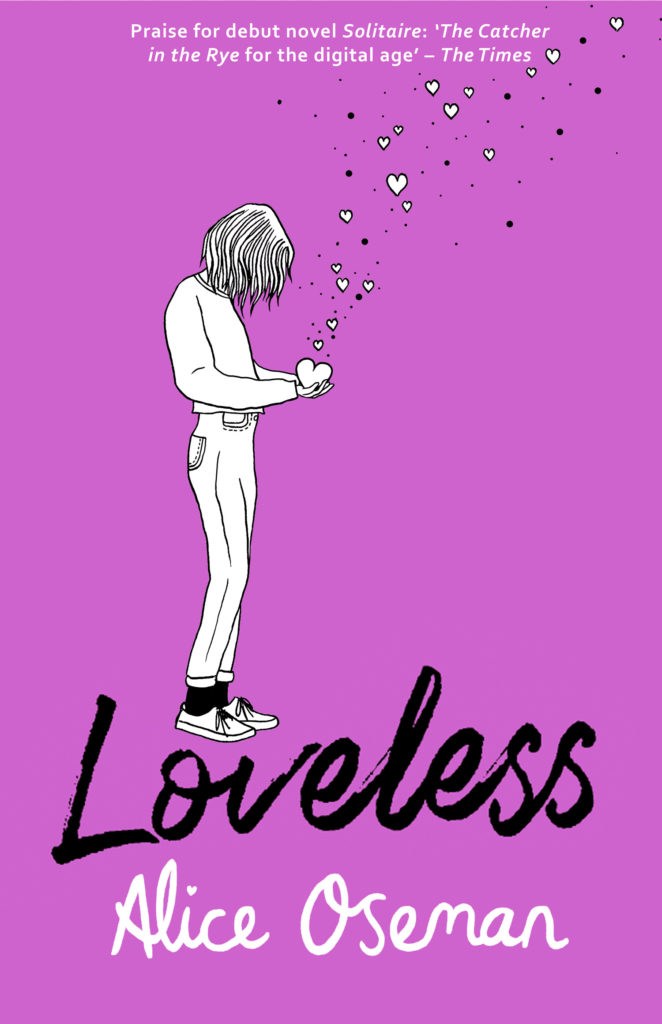Rob Bittner
Sitting in the car on the driveway of my family home, the ghost of a boy’s hand on my thigh, I made a plan.
I was going to university soon. A chance to reinvent myself and become someone who could fall in love, someone who would fit in with my family, with people my age, with the world. I’d make a load of new friends. I’d join societies. I’d get a boyfriend. Or a girlfriend, even. A partner. I’d have my first kiss, and I’d have sex. I was just a late bloomer. I wasn’t going to die alone.
I was going to try harder.
I wanted forever love.
I didn’t want to be loveless.
Oseman 29 (ARC)
Georgia is heading off to university with her friends, Pip and Jason. She’s ready to start a whole new chapter in her life and is also determined to figure out why she hasn’t had a crush on anyone, or why she has no desire to kiss or hook up with anyone, no matter how attractive or available they may be. Georgia’s roommate, Rooney, tries to help, but she has a lot of emotional baggage to work through on her own. Luckily, Georgia meets Sunil, president of the Pride Society, who helps her understand where she might fit in the LGBTQIA+ spectrum. As the academic year moves forward, though, Georgia, Pip, Jason, and Rooney all find themselves tangled up in a complicated web of emotions and feelings toward one another. They’re all about to make a pretty big mess. The question is, will their emotional connections allow them to survive the year without hurting each other beyond repair?
Back in 2011-2012, I was working on an article examining the role of sex and sexually explicit scenes in YA literature, especially related to LGBTQIA+ characters. At that time, much of the existing literature contained fade-to-black sex scenes, and I argued this lack of explicit sex on the page was a disservice to young queer and trans readers who could potentially find opportunities for learning within the literature they consumed. What my research failed to consider at the time, was the existence (or lack thereof) of aromantic (aro) and asexual (ace) representation.
Ace and aro representation is imperative, on library shelves, in bookstores, and in classrooms. In their 2018 study on teaching LGBTQ-themed YA, Katherine E. Batchelor et al. note that none of the books available to students in their classes, “have talked about asexual [relationships], so you could be reading these books and not even be interested in sexual relationships, and the reader might think it’s just a phase or they’re too young, but some people are just asexual” (32). Oseman’s work, therefore, is an important addition to the existing field of books about LGBTQIA+ people, especially since she digs so deeply into the reasons why ace/aro people are so often misunderstood and underrepresented.
For instance, when Georgia goes to a club with friends early in the school year, she observes, “I started to notice just how many of the songs were about romance or sex. How had I never noticed that before? Like, almost all songs ever written are about romance or sex. And it felt like they were taunting me” (64 in ARC). Numerous times throughout the book, friends and family say things like, “you’ll find the right person”, or “you just haven’t found the right guy yet”, further emphasizing how entrenched expectations around sex and relationships are in society.
But Oseman makes sure to include a range of characters, so Georgia has allies as well. They help her to understand that asexuality is “a big, big spectrum with a whole range of different feelings and experiences. And there’s really no way to tell how one specific person feels, even if they openly describe themselves as asexual” (180 in ARC). When she begins to realize that she is ace/aro, Georgia believes she has to do something in order to prove her identity is valid, but her friend Sunil reminds her that: “There’s nothing you have to do except be” (260 in ARC).
Loveless is a beautiful and heartfelt novel that celebrates ace/aro identities and works to disrupt many social assumptions around sex, romance, families, and friendship through a wonderfully messy and chaotic narrative. Georgia’s struggles to break away from these assumptions and find peace in her identity are both specific to aro/ace people and also universal to anyone finding ways to feel accepted and “normal.” Oseman’s cast of characters represent a racially, sexually, and gender diverse spectrum, and each of their perspectives help to bring even more depth to the narrative.
The book includes a list of resources on ace/aro identities and where to find help and support. Loveless is an obviously personal book for Oseman, as she notes in the Acknowledgments, and her connection to Georgia’s story shines through on the page. The book is complicated, messy, raw, and real, and it has the potential to help many people discover they are not alone and their feelings are completely valid.
Highly Recommended
References:
Bittner, R. (2012). Queering Sex Education: Young Adult Literature with LGBT Content as Complementary Sources of Sex and Sexuality Education, Journal of LGBT Youth, 9(4), 357-372.
Batchelor, K.E., Maria Ramos & Samantha Neiswander (2018). Opening Doors: Teaching LGBTQ-themed Young Adult Literature for an Inclusive Curriculum. The Clearing House: A Journal of Educational Strategies, 91(1), 29-36.

Loveless (Alice Oseman)
Scholastic Press
ISBN: 9781338751932
432 pages
Publication date: 9 July 2020
